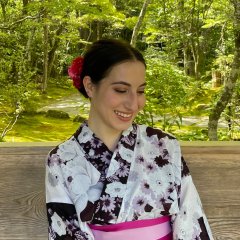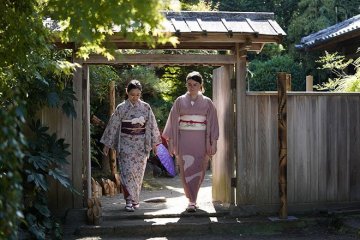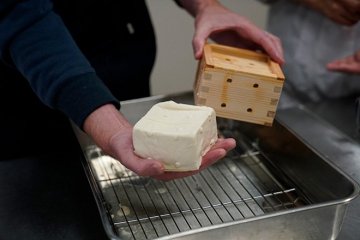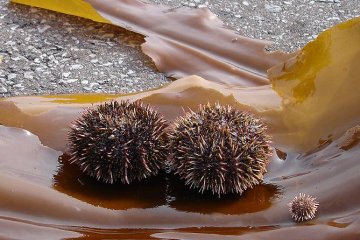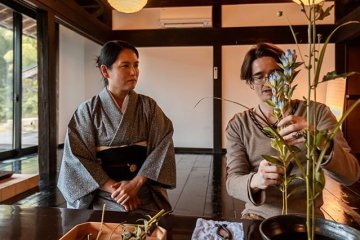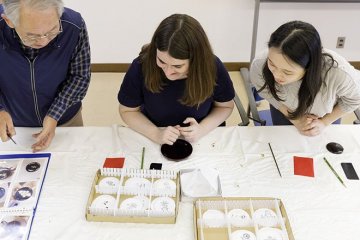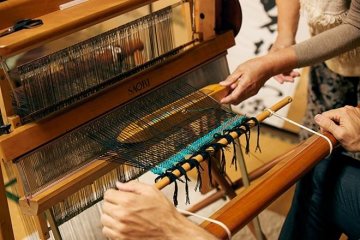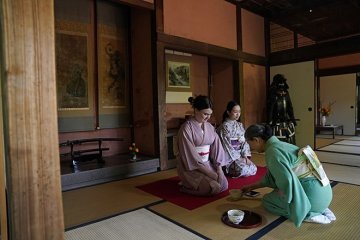Are you ready to put your hands to use?
Japan is a culturally rich country, filled with customs that are still practiced today. For an authentic Japanese experience, try your hand at some of these traditional workshops and learn from an expert in the field. Whether you are cooking food or recreating historic crafts, these practices will offer invaluable insights into the country’s heritage and leave you with tangible souvenirs that will immortalize your memories.
Check out the below traditional workshops, and find the ones that speak to you.
Tofu Making

Tokachi district in Hokkaido Prefecture is renowned for its agricultural produce, making it the perfect place to try some hands-on food activities. Stop by Tokachi Agriculture Museum Obihiro Visitor Center for a number of indoor and outdoor experiences.
The center’s most popular program is its tofu-making class. The process starts with locally grown soybeans that you blend to a yogurt-like consistency. Then, squeeze the blended product in a cloth to remove all moisture, add a thickening agent, and shape it in a wooden box. Afterwards, you are left with a personally made block of tofu! The staff then use your tofu to prepare a delicious meal. The tofu’s luscious, creamy texture tastes different every time, so enjoy the nuances of your handcrafted masterpiece.
Learn more: https://countrysidestays-japan.com/article/obihiro/index2.html
Sea Urchin Fishing and Kelp Workshop

For a change of pace, visit Rishiri island off the coast of northern Hokkaido. This remote island is filled with quaint seaside villages that offer visitors opportunities to experience authentic ocean activities. Some popular options are sea urchin and crab fishing, as well as a kelp workshop, all of which are available from June to September.
Meet your fellow sailors at Kamui Kaigan Park, and set off into the shallows on a canoe. Learn the hooking techniques of sea urchin fishing, and then enjoy your fresh catches right on the boat. Savor the delicate flavors of the ocean with this local delicacy. Also, rent some specialized crab fishing tools, and see how many crustaceans you can catch! Continue your oceanic education with a kelp workshop. This sea-growing plant is a vital part in dashi soup stocks. During the class, learn about kelp farming, and create a personalized piece of kelp to bring home as a tasty souvenir.
Learn more: https://countrysidestays-japan.com/article/rishiri/index.html
Mochi-tsuki Making

Japanese food enthusiasts will not want to pass up the opportunity to make fresh mochi-tsuki at Chiba Farm in Yakumo town. This unique Hokkaido town, situated between the Pacific Ocean and Sea of Japan, is abundant in ocean breezes as well as lush hillsides.
Before creating the mochi-tsuki, don a bright happi, a traditional tub-sleeved Japanese coat, and prepare yourself for some manual labor. With a mallet in hand, pound the freshly made glutinous rice until it is smooth. Then, help the Chiba family fill the dough with daifuku, or sweet red bean paste. Finally, take a bite of your homemade treat and savor the soft mochi texture balanced against the earthy sweetness of the red bean filling. If you are interested in outdoor activities, the farm also offers vegetable harvesting and rice paddy walks.
Learn more: https://countrysidestays-japan.com/article/yakumo/index2.html
Traditional Silk Dyeing

In Zao, Miyagi Prefecture, visit Higurashi-no-Kan, a pottery shop, and try your hand at kusakizome, a traditional silk dyeing method that uses local plants. When you enter the quaint farmhouse, you are greeted by a welcoming scene of drying flowers, branches, berries, and leaves, alluding to the natural dyeing process to come. Miyagi native, Oizumi-san, serves as your teacher and walks you through the authentic process of cloth dyeing. Choose between a silk scarf or kerchief, both of which are laced with subtle yet elegant patterns. Then, follow Oizumi-san on a journey of dyeing, drying, and ironing. After the experience, leave the establishment with a new piece of clothing imbued with culturally significant customs that you can wear proudly.
Learn more: https://countrysidestays-japan.com/article/zao/index.html
Japanese Flower Arranging (ikebana)

For a tranquil and artistic activity, try ikebana, or Japanese flower arranging. The multi-hour workshop is held in Fujino Town (modern day Midori Ward, Sagamihara City) and hosted by the amiable Shino. The town’s natural blessings make it the perfect place to gather local flowers and foliage for your creation. With Shino’s guidance, envision a peaceful garden, and then translate those feelings into a beautiful display of nature. Flower arranging in Japan is an important cultural practice that not only demonstrates beauty, but also one’s care and appreciation for the environment. At the end of the soothing experience, your mind and soul will feel rejuvenated.
Learn more: https://countrysidestays-japan.com/article/sagamihara/index.html
Soba Noodle Making

Shinano Town in Nagano Prefecture is renowned for its soba noodles thanks to its local production of soba (buckwheat). Immerse yourself in the soba culture by participating in a noodle making class at the restaurant, Sobadokoro Takasawa.
Soba expert, Toshiko Kobayashi, happily walks eager guests through the process. After securing a bandana around your head, follow the steps of dough making, kneading, rolling, and cutting to create your fresh noodles. Afterwards, Toshiko boils your noodles and presents them to you with additional dishes of tempura, soba dango (fried soba balls), and tsuyu broth garnished with wasabi and scallions for dipping. Enjoy the earthy taste of your handcrafted noodles with a newfound appreciation.
Learn more: https://countrysidestays-japan.com/article/shinano/index2.html
Lacquerware Workshop

In its most recognizable form, Japanese lacquerware is characterized by its sleek finish and contrasting colors of red and black. Sabae City in Fukui Prefecture serves as a center of lacquerware development in Japan and thus, is an essential place to learn about the centuries old craft. For insight into this industry, visit Echizen Lacquerware Traditional Industry Hall in Kawada and peruse the building’s extensive collection of Echizen lacquerware. The establishment also serves as a hub for lacquerware artists.
After learning about the lacquerware industry, join a workshop led by one of the association’s expert artisans. Choose your desired class–either e-tsuke (drawing), chinkin (carving), or fuki-urushi (lacquer application and wiping)–and then start creating. At the end, you will have an elegant piece of art that will forever immortalize the experience.
Learn more: https://countrysidestays-japan.com/article/sabae/index1.html
Washi Paper Making

Learn how to make washi paper at Echizen Washi Village in Echizen City, Fukui Prefecture, Japan’s top producer of the traditional paper. This thick and resilient paper was most prevalent during the Edo period. The village offers multiple workshops where you can learn about the historic industry and make or color your own piece of washi paper. For an extra special experience, visit the village in early May to witness the Kami Festival, which is a three-day celebration honoring the renowned paper.
Learn more: https://countrysidestays-japan.com/article/echizen/index.html
SAORI Weaving

Put your artistic abilities to use by enrolling in a SAORI weaving class. WAKKA, an Omishima cycling facility, connects guests to this workshop, which takes place in the teacher’s home. SAORI weaving is a special art that prioritizes flexibility over rules, making everyone essentially an expert. After your teacher demonstrates how to use the loom (the apparatus used to make fabric), she steps aside and allows you complete creative freedom. Try weaving tapestries or placemats, and lose yourself in the methodical process. Leave the facility with a personalized cloth featuring your thoughts, feelings, and memories in every stitch.
Learn more: https://countrysidestays-japan.com/article/imabari/index2.html
Dress in a Kimono and Attend a Tea Ceremony

For a traditional slice of Japanese life, don a kimono and participate in a tea ceremony. Izumi City’s samurai district in Kagoshima Prefecture provides the perfect backdrop for a day in the past. Your adventure starts at Izumi-Fumoto History Museum where your hosts, Fumiko and Nobuko, help you select and dress into a kimono of your choosing. Choose wisely, because you keep the kimono thatyou pick!
Then, follow Fumiko and Nobuko through the preserved Edo-period townscape to one of the samurai residences for a tea ceremony and possible koto performance. After the ceremony, continue your journey by touring the town’s historic residences, riding a cow-pulled carriage, and enjoying a soba noodle lunch.
Learn more: https://countrysidestays-japan.com/article/izumi/index2.html


